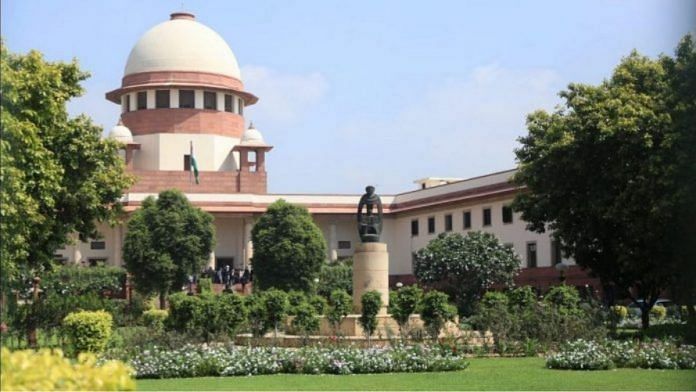New Delhi: The Supreme Court Monday came to the aid of a 17-year-old Dalit boy, exercising its extraordinary powers to direct the IIT Bombay to create a seat for him. The boy had qualified for admission to the institution, but had missed out on the seat due to non-payment of fees because of technical and server error.
A bench comprising Justices D.Y. Chandrachud and A.S. Bopanna said it would be a “great travesty of justice” if the boy, Prince Jaibir Singh, is denied admission for non-payment of fees despite having tried. The court then directed the Joint Seat Allocation Authority (JOSAA) to earmark a seat for the student.
The court, however, clarified that the seat should be allocated to Singh without disturbing the admission of any other student.
The JOSAA 2021 has been set up by the Ministry of Education to manage and regulate the joint seat allocation for admissions to 114 institutes for the academic year 2021-22. This includes 23 IITs, 31 NITs, IIEST Shibpur, 26 IIITs and 33 other Government Funded Technical Institutes.
In doing so, the court felt that it was a fit case for using its powers under Article 142 of the Constitution, which allows it to pass any order necessary to do “complete justice” in any case.
“The Supreme Court in the exercise of its jurisdiction may pass such decree or make such order as is necessary for doing complete justice in any cause or matter pending before it…” Article 142 states.
Also read: ‘Grave error, unacceptable’ — why SC set aside Bombay HC’s ‘skin-to-skin’ contact POCSO verdict
‘Sometimes we have to rise above the law’
During the hearing last week, Justice Chandrachud had remarked, “Here is a Dalit boy who has made it to the IIT. How many students are able to achieve that? He may rise to lead the country in the next 10 years! Now, he is losing out on his seat for no fault of his. While he may be ousted on a point of law, on humanitarian grounds, sometimes, we have to rise above the law.”
The court had therefore asked IIT-Bombay authorities to procure details of the admissions list and explore the possibility of allotting Prince Jaibir Singh a seat.
During the hearing Monday, the court old the authorities: “Don’t be wooden like this. He cleared the exam last year, he cleared it this year, he just could not pay the fee in time. Deal with him with a humanitarian approach… You have to look at what the reality on the ground is, the reality of our social life… This is not some case where the student has been negligent or at fault. This is a genuine case.”
However, when the JOSAA informed the court that no vacant seats were now available for the course, the court passed the order under Article 142.
Bombay HC had rejected plea
The petitioner had passed the Joint Entrance Examination (JEE) Advanced 2021 with an all-India rank of 25,894 and Scheduled Caste (SC) category rank of 864. He was, therefore, allotted a seat at IIT-Bombay for civil engineering on 27 October this year.
According to the petition, Singh then logged into the Joint Seat Allocation Authority’s (JOSAA) website on 29 October and uploaded the requisite documents. However, he fell short of money that day and couldn’t make the payment. The petition had screenshots and access history of such attempts attached to it.
When his sister transferred the money to him on 30 October, Singh now claimed he was unable to make the payment anymore despite trying almost a dozen times. This, the plea said, was “due to a technical error at the end of his card issuing bank, viz., State Bank of India”. After this, he tried to pay the fee at a cyber cafe, called the IIT-Bombay authorities, and emailed them, but to no avail.
While the Bombay High Court refused to hear his petition, the Supreme Court now allowed his plea, invoking Article 142 of the Constitution.
The provision has earlier been invoked in several landmark cases. It was used in the Babri Masjid demolition case against top BJP leaders L.K. Advani and Murli Manohar Joshi, as well as to transfer the criminal trial in that case from Rae Bareli to Lucknow. The court also referred to the provision in 1989 to provide relief to the thousands of people affected by the Bhopal gas tragedy, and in 2014 to cancel allocation of coal blocks granted from 1993 onward, without any specific finding on the wrongdoing by those who were allotted these blocks.
(Edited by Neha Mahajan)
Also read: Incentivise legal aid, give it weightage in selecting ‘senior’ advocates: SC Justice UU Lalit



